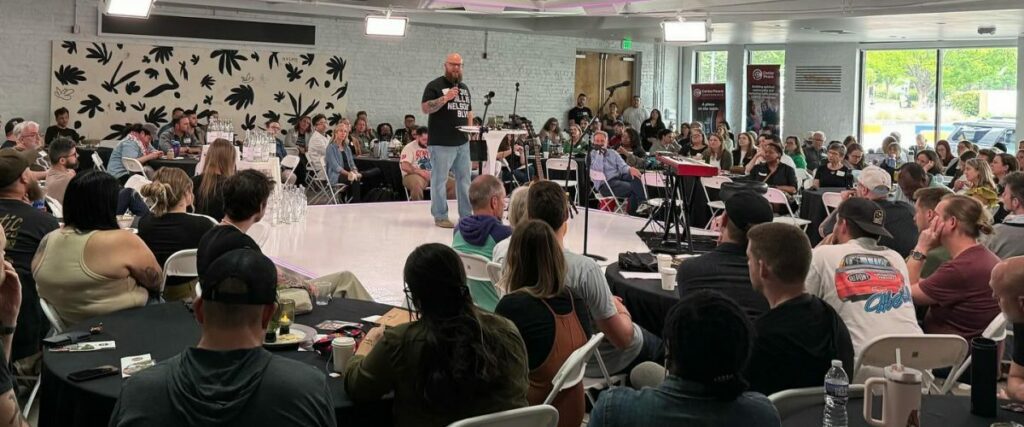History may well record that April 16-17, 2024, marked a breakthrough moment in the emergence of an organized post-evangelical Christian movement in the United States.
It certainly felt like a breakthrough to this participant-observer, as I had the privilege of attending the third and by far the largest national gathering of the Post-Evangelical Collective last week. Stuffing 300 people into Church on Morgan in downtown Raleigh, N.C., a space surely designed for about 200, the national meeting went a long way toward defining who at least this group of post-evangelicals is becoming.
First, a bit of background. Post-evangelicals are, as the name suggests, formerly evangelical Christians. What makes them “post” is a) a break with the evangelical subculture and/or b) a break with evangelical beliefs and practices. All are done with the evangelical subculture, but the level of theological movement varies quite a bit.
While some doctrinal matters that once were settled are now open for reconsideration, what the post-evangelicals have not done is leave Jesus, or church, behind. Affirmations of faith in Jesus Christ and numerous heartfelt prayers at this conference, as everywhere I visit in post-evangelical circles, signal the survival of a passionate Christian piety.
A significant number of post-evangelicals would describe their experience as having had some expression of evangelical Christianity break with them, rather than the other way around.
For example, at the meeting in Raleigh there were a sizable number of pastors who had lost their churches and even their ordination over their conscientious decisions around issues like LGBTQ inclusion. They had done all the things evangelicals (say they) do to undertake a religious and moral discernment process, but the results were so displeasing to their authorities that it cost them everything.
Many post-evangelicals would say that, in their widespread embrace of MAGA-evangelicalism and frequent turns toward misogyny and xenophobia, evangelicals were the ones that have done the leaving; that is, they have left behind the very faith and values they had once attempted to live and to teach their children.
That is to say this: The preponderance of post-evangelicals are the disillusioned children and grandchildren of evangelicals.
Post-evangelicals are not Mainline Protestants — although some may eventually affiliate with one of the historic Mainline denominations, and some interesting mutual discussions are beginning to emerge.
Many of us do recognize this moment provides an opportunity to rethink or perhaps even remake the religious landscape, which has for so long included the rigid old distinction between Mainline and evangelical. With the collapse of the credibility of evangelicalism, why must this iron wall be maintained?
But overall, post-evangelicals appear most comfortable continuing with many of the stylistic proclivities of the evangelical subculture — in dress, music, worship and preaching — and like their evangelical forebears they continue to demonstrate a kind of entrepreneurial genius when it comes to creating church expressions attractive to today’s young adults. Every post-evangelical congregation I have visited over these last few years is aswarm with children.
“Every post-evangelical congregation I have visited over these last few years is aswarm with children.”
When something new is being built, every decision at the founding stage has special significance. The PEC, now organized as a 501(c)3, is led by a small board and an even smaller staff, featuring Executive Director Keri Ladouceur. I serve on a “wisdom board” mainly of older leaders (guilty as charged) who are there to support the mainly younger leadership. The approach Keri and the board are taking is intentionally collaborative, passionately inclusive and deeply allergic to the celebrity culture of evangelicalism. Both main stage and breakout session speakers reflected diversities of identity and life experience one would never, ever see at an evangelical event.
Seminars addressed spiritual abuse and how to become wounded healers after religious trauma, new paradigms for ministry with children and youth, intersectional theology, new approaches to the business side of church, new approaches to worship and creative arts — by the way, some powerful new music is being written right now by post-evangelicals — overcoming polarization, spiritual direction, open and relational theology, LGBTQ healing, the process of moving a church toward inclusion, peacemaking, burnout, race, spirituality and mental health, and more. I did a seminar on Christian humanism, and the 40 souls packed into and near that 20-chair room gave me encouragement to go ahead and write more about this ancient idea with such contemporary potential.
The most moving experience of the whole event, for me at least, took place in the last session. It was a “re-frocking” experience for those who had been stripped of their ordination credentials. Deploying the text from John 21 where Jesus reinstates Peter to ministry, each participant was asked to reaffirm their love for Jesus and, implicitly, their commitment to Christian ministry. There were few dry eyes when senior figures at the meeting gathered around and laid hands on these young leaders as they were essentially re-commissioned for ministry. PEC is not a denomination, and this was not ordination, but it sure felt like it at that moment.
Imagine churches in every community led by called and gifted pastors and musicians who have brought forward the creativity, entrepreneurialism and communication gifts of the best of evangelical subculture but left behind the old arguments over who exactly gets how much inclusion or whether justice is a Christian value or … well, you probably know the rest.
Do you think such churches might find a hearing? Indeed, they might and do. From where I sit, these churches are the best hope of reaching the young adults of this era. I am glad to be on the journey with them.
This article was first published on Baptist News Global.

